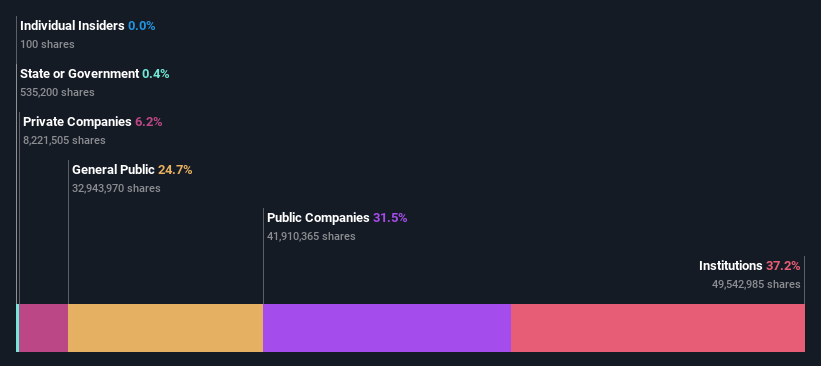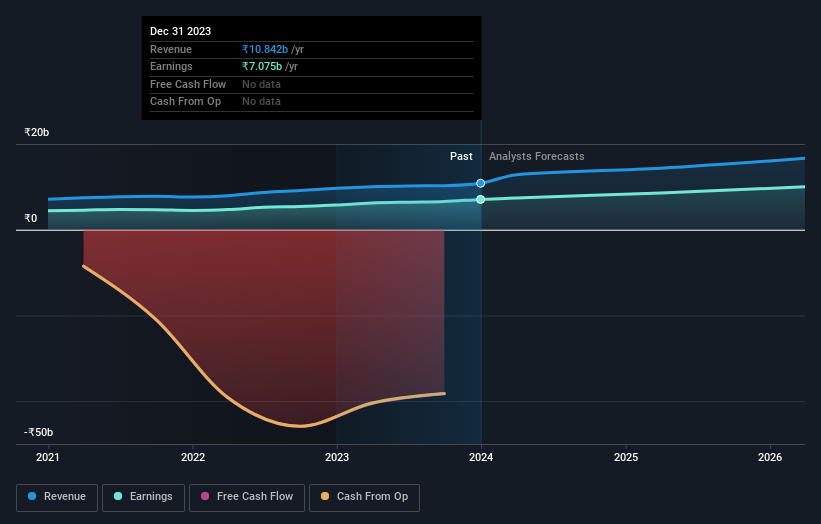- India
- /
- Diversified Financial
- /
- NSEI:CANFINHOME
Institutional investors in Can Fin Homes Limited (NSE:CANFINHOME) see ₹4.2b decrease in market cap last week, although long-term gains have benefitted them.

Key Insights
- Institutions' substantial holdings in Can Fin Homes implies that they have significant influence over the company's share price
- A total of 6 investors have a majority stake in the company with 52% ownership
- Ownership research along with analyst forecasts data help provide a good understanding of opportunities in a stock
If you want to know who really controls Can Fin Homes Limited (NSE:CANFINHOME), then you'll have to look at the makeup of its share registry. With 37% stake, institutions possess the maximum shares in the company. That is, the group stands to benefit the most if the stock rises (or lose the most if there is a downturn).
Institutional investors endured the highest losses after the company's market cap fell by ₹4.2b last week. However, the 45% one-year return to shareholders might have softened the blow. We would assume however, that they would be on the lookout for weakness in the future.
Let's delve deeper into each type of owner of Can Fin Homes, beginning with the chart below.
See our latest analysis for Can Fin Homes

What Does The Institutional Ownership Tell Us About Can Fin Homes?
Institutional investors commonly compare their own returns to the returns of a commonly followed index. So they generally do consider buying larger companies that are included in the relevant benchmark index.
We can see that Can Fin Homes does have institutional investors; and they hold a good portion of the company's stock. This can indicate that the company has a certain degree of credibility in the investment community. However, it is best to be wary of relying on the supposed validation that comes with institutional investors. They too, get it wrong sometimes. When multiple institutions own a stock, there's always a risk that they are in a 'crowded trade'. When such a trade goes wrong, multiple parties may compete to sell stock fast. This risk is higher in a company without a history of growth. You can see Can Fin Homes' historic earnings and revenue below, but keep in mind there's always more to the story.

Hedge funds don't have many shares in Can Fin Homes. Canara Bank is currently the company's largest shareholder with 30% of shares outstanding. Chhattisgarh Investments Limited is the second largest shareholder owning 6.2% of common stock, and DSP BlackRock Investment Managers Pvt. Ltd. holds about 4.6% of the company stock.
We did some more digging and found that 6 of the top shareholders account for roughly 52% of the register, implying that along with larger shareholders, there are a few smaller shareholders, thereby balancing out each others interests somewhat.
While it makes sense to study institutional ownership data for a company, it also makes sense to study analyst sentiments to know which way the wind is blowing. There are plenty of analysts covering the stock, so it might be worth seeing what they are forecasting, too.
Insider Ownership Of Can Fin Homes
While the precise definition of an insider can be subjective, almost everyone considers board members to be insiders. Company management run the business, but the CEO will answer to the board, even if he or she is a member of it.
Insider ownership is positive when it signals leadership are thinking like the true owners of the company. However, high insider ownership can also give immense power to a small group within the company. This can be negative in some circumstances.
Our data suggests that insiders own under 1% of Can Fin Homes Limited in their own names. We do note, however, it is possible insiders have an indirect interest through a private company or other corporate structure. It is a pretty big company, so it would be possible for board members to own a meaningful interest in the company, without owning much of a proportional interest. In this case, they own around ₹76k worth of shares (at current prices). It is always good to see at least some insider ownership, but it might be worth checking if those insiders have been selling.
General Public Ownership
With a 25% ownership, the general public, mostly comprising of individual investors, have some degree of sway over Can Fin Homes. While this size of ownership may not be enough to sway a policy decision in their favour, they can still make a collective impact on company policies.
Private Company Ownership
We can see that Private Companies own 6.2%, of the shares on issue. It might be worth looking deeper into this. If related parties, such as insiders, have an interest in one of these private companies, that should be disclosed in the annual report. Private companies may also have a strategic interest in the company.
Public Company Ownership
Public companies currently own 31% of Can Fin Homes stock. We can't be certain but it is quite possible this is a strategic stake. The businesses may be similar, or work together.
Next Steps:
It's always worth thinking about the different groups who own shares in a company. But to understand Can Fin Homes better, we need to consider many other factors. For example, we've discovered 2 warning signs for Can Fin Homes (1 makes us a bit uncomfortable!) that you should be aware of before investing here.
Ultimately the future is most important. You can access this free report on analyst forecasts for the company.
NB: Figures in this article are calculated using data from the last twelve months, which refer to the 12-month period ending on the last date of the month the financial statement is dated. This may not be consistent with full year annual report figures.
New: AI Stock Screener & Alerts
Our new AI Stock Screener scans the market every day to uncover opportunities.
• Dividend Powerhouses (3%+ Yield)
• Undervalued Small Caps with Insider Buying
• High growth Tech and AI Companies
Or build your own from over 50 metrics.
Have feedback on this article? Concerned about the content? Get in touch with us directly. Alternatively, email editorial-team (at) simplywallst.com.
This article by Simply Wall St is general in nature. We provide commentary based on historical data and analyst forecasts only using an unbiased methodology and our articles are not intended to be financial advice. It does not constitute a recommendation to buy or sell any stock, and does not take account of your objectives, or your financial situation. We aim to bring you long-term focused analysis driven by fundamental data. Note that our analysis may not factor in the latest price-sensitive company announcements or qualitative material. Simply Wall St has no position in any stocks mentioned.
About NSEI:CANFINHOME
Can Fin Homes
Provides housing finance services primarily to individuals, builders, corporates, and others in India.
Undervalued established dividend payer.
Similar Companies
Market Insights
Community Narratives




